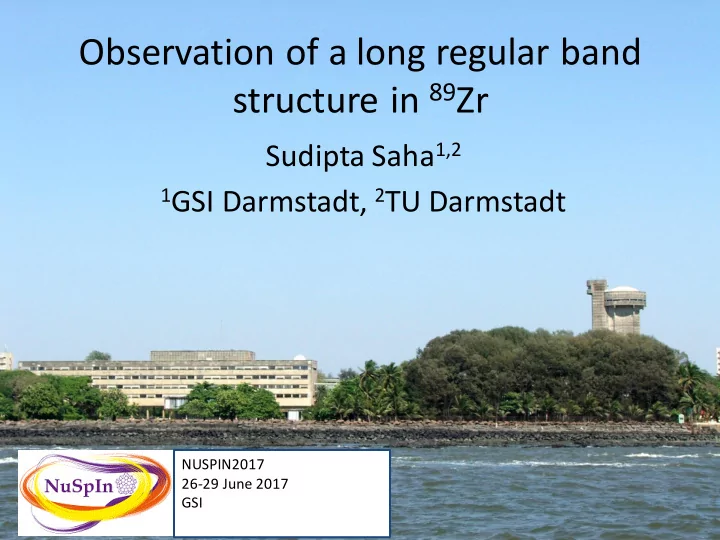

Observation of a long regular band structure in 89 Zr Sudipta Saha 1,2 1 GSI Darmstadt, 2 TU Darmstadt NUSPIN2017 26-29 June 2017 GSI
Outline Motivation Experimental details Results Summary
Ground state deformation of the nuclear landscape Deformed band has E 4+ /E 2+ been observed In 56 Ni Phys. Rev. Lett. 82, 3763 – 3766 (1999) Z (number of protons) Difficult to produce high spin Z=40 subshell closure is a good region to probe high spin N (number of neutrons) Super deformation has been observed in 40 Ca Phys Rev Lett. 87 (2001) 222501.
Experimental Details INGA@TIFR 24 CS clover HPGe Detectors Efficiency 5% @ 1MeV Detectors at 23 o , 40 o , 65 o , 90 o , 115 o , 140 o and 157 o : Angular distribution Polarisation and DCO Target R. Palit et. al . Nucl. Inst. Meth. A 423, 90 (2012)
Reaction mechanism Figs. taken from PhD. thesis of Ali Al-Khatib
Fusion evaporation reaction to produce high spin states Reaction: 13 C + 80 Se @ 50, 60 MeV Detectors: INGA with 18 clovers. A total of 1×10 9 coincidence events with fold f ≥ 2 were collected. Target details: 1) Thick Target 800 µg/cm 2 80 Se on 9 mg/cm 2 Au foil 2) Thin Target 500 μ g/cm 2 80 Se on 80 μ g/cm 2 Al foil
Known gamma rays Level scheme of 89 Zr New gamma rays S. Saha et al. PRC86(2012)
Search for higher spin states: problem and solution If the residue is allowed to escape the target Doppler shift of emitted ϒ -ray can be corrected. Resolution of fast transitions improves. Thin target Thick target
DCO and polarisation asymmetry measurement For INGA geometry J i γ1(L,L’) 𝐽 𝛿 1 𝑝𝑐𝑡𝑓𝑠𝑤𝑓𝑒 𝑏𝑢 157° 𝑏𝑢𝑓𝑒 𝑝𝑜 𝛿 2 𝑏𝑢 90° J f R DCO = 𝐽 𝛿 1 𝑝𝑐𝑡𝑓𝑠𝑤𝑓𝑒 𝑏𝑢 90° 𝑏𝑢𝑓𝑒 𝑝𝑜 𝛿 2 𝑏𝑢 157° γ 2(L=2) Gate J f -1 Transitions are M1 in nature
jun45 jj44b E exp – E calculation (keV) The shell model calculation systematically deviates from above spin 35/2 - . Contribution from excitation across N=50 shell gap? Requires larger model space?
Configuration dependent Cranked Nilsson Strutinsky (CNS) approach h 0 is the nucleon hamiltonian in the lab frame j x is the component of total angular momentum of individual nucleon in the rotational axis
Nomenclature: [p1p2, n1n2] p1 -> proton holes in fp p2 -> proton particles in g 9/2 n1 -> neutron holes in g 9/2 n2 -> neutron particle in gd Filled markers rep. α = 0 Open markers rep. α = 1 Solid line rep. π = +1 Dashed line rep. π = -1
Nomenclature: [p1p2, n1n2] p1 -> proton holes in fp p2 -> proton particles in g 9/2 n1 -> neutron holes in g 9/2 n2 -> neutron particle in gd Filled markers rep. α = 0 Open markers rep. α = 1 Solid line rep. π = +1 Dashed line rep. π = -1
Cranking calculations using Multi-quasi-particle configurations Excitation energy relative to a rotating liquid Drop w.r.t. spin for the observed negative parity Dipole band. 2d 3/2 3s 1/2 1g 7/2 1d 5/2 1g 9/2 N=50 Z=40 1g 9/2 2p 1/2 X X X X 2p 1/2 X 2p 3/2 2p 3/2 1f 5/2 1f 5/2
Potential Energy Surface – The Lund Convention
Rotation around short axis Rotation around long axis The axis of γ = -75 0 rotation seems to be changing from collective shortest to longest axis Termination
Lifetime measurement using Doppler Shift Attenuation Method Angle w.r.to Beam direction 40 o 140 o 589 keV 675 keV H.I. Beam Target Backing
Summary • The excited levels of 89 Zr have been observed up to ~ 12 MeV excitation energy. • Shell model calculation provide good agreement up to 35/2 - ħ. • Evidence of cross shell excitation is observed at higher spin. • Lifetime measurement has been performed for 5 levels. • A regular band with 10 transition is observed at high spin – outside the scope of f 5 pg 9 model space. • CNS calculation gives good agreement to the observation. • Particle excitation across N=50 shell gap is expected. • The Potential energy surface (PES) plot indicates axis of rotation changing from shortest to longest axis of rotation before termination.
Collaboration and Acknowledgement R.Palit, J.Sethi, S. Biswas ---TIFR, Mumbai, India A. K. Singh ---IIT Kharagpur, India CNS Calculation S. Nag ---NIT Raipur, India Z. Naik ---Sambalpur University, India HFB Calculation P.C. Srivastava ---IIT Roorkee, India Shell Model Calculation INGA Collaboration The authors are highly indebted to Prof. I. Ragnarsson for his advices and suggestions regarding cranked Nilsson Strutinsky calculations as well as theoretical interpretations of the observed phenomenon. Thanks to Pelletron Linac Facility at TIFR for good quality beam.
Recommend
More recommend